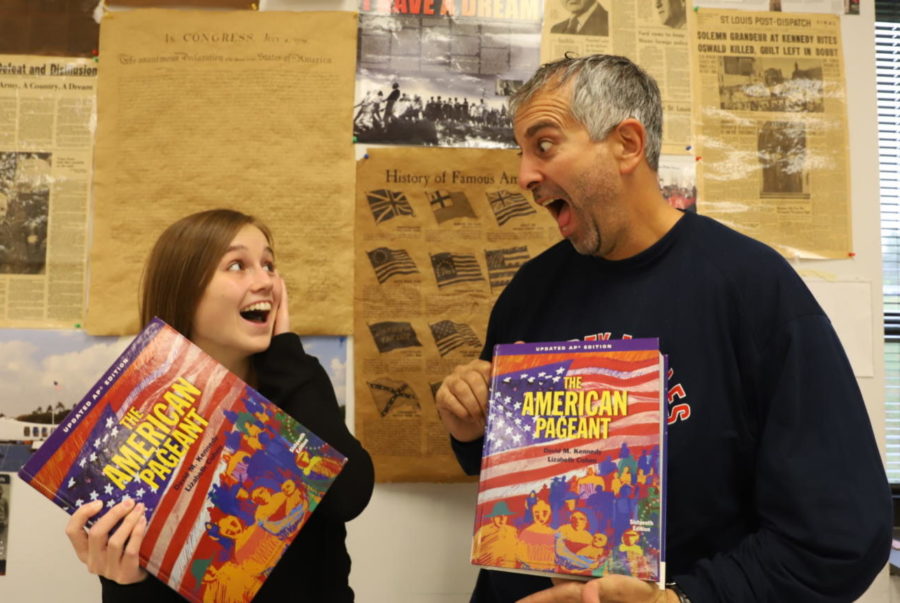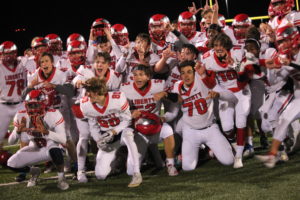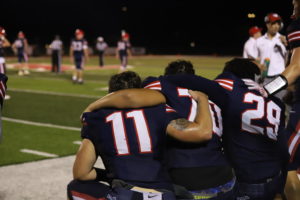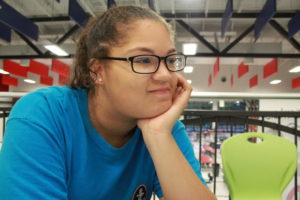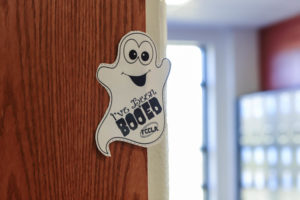AP American Stress
Is APUSH’s reputation warranted?
AP United States History has gained notoriety for its difficulty, often scaring the students who take it.
November 6, 2019
Every year, at least one worn-out looking sophomore can be seen wielding “The American Pageant” as they walk through the halls.
AP United States History, commonly referred to as APUSH, is known for being one of the most difficult high school classes. Its heavy textbook, extensive curriculum and hundreds of vocabulary notecards have made APUSH infamous, the “He-who-must-not-be-named” of advanced level classes. However, is APUSH really as bad as its reputation suggests?
“It’s stressful to manage the workload,” Jaden Zelidon, a sophomore currently taking APUSH, said. “[APUSH’s workload] is self-paced and sometimes that’s a struggle.”
Mr. Raziq, who teaches APUSH, works to prepare students for college-level courses. All AP courses are facilitated by the College Board, with certain requirements for each class. For APUSH, the material spans the pre-Columbus era to modern-day. Mr. Raziq submits a framework for his class to ensure that he covers everything.
Accompanying this new workload is a fear of the unexpected.
“I think one of the reasons [APUSH] has developed this reputation is that it’s the first AP class a number of students have taken. The first time you do something, whatever it is, it’s a little more intense and you don’t know what to expect, so it’s harder,” Raziq said. “When I ask students later on who are now taking multiple AP classes, they’re doing fine. Even though it’s hard, they rarely say they’re overwhelmed or they can’t do it. I think that’s because their perspective changes.”
This is the case for sophomore Aly Hively. APUSH certainly came as a shock compared to other classes, but she doesn’t see herself giving up on advanced placement courses.
“I didn’t know what to expect. A lot of people were like, ‘don’t take it, it’s horrible,’” Hively said. “After taking it I’ve realized that next year I’ll probably take more AP classes. It’s better to do [difficult classes] now than down the line.”
Still, that initial hurdle is difficult to overcome, creating stress in many APUSH students. Going from a normal class to one where a 70 percent can be the best test score in the class requires a massive mind jump, especially considering the typical perfectionism of the students who sign up for advanced courses. They often struggle to grasp their success if their grades aren’t where they want them to be.
“[Lots of people] freaked out on the first test,” Zelidon said. “Sometimes it’s not a do-or-die thing. If you get a C on a test, it’s not the end of the world. You can recover from it.”
Mr. Raziq has noticed this tendency in his students.
“It’s a vicious cycle. I understand why you need to have good grades and test scores for things like colleges and scholarships, but there’s this idea that if you don’t get good grades you won’t be successful. That is so not true,” Raziq said. “It’s kind of a shame because instead of being about learning and self-improvement they only consider the end result. That end result is not what’s going to carry you through in life.”
Through conversations with his classes, Mr. Raziq works to combat the mindset his students enter APUSH with.
“I try to talk about the reality that imperfection is okay. You learn more from failure than you do success because you learn how to get better,” Raziq said. “A lot of the pressure that [AP students] feel is self-induced. You can’t do that because it will ruin your experience.”
Senior Aimee Weber took APUSH her sophomore year. She certainly hasn’t forgotten the difficult moments, but she believes the experience she gained was worth the effort she put in.
“While I was in [APUSH] I was definitely stressed out a lot because it was the hardest class I had ever taken,” Weber said. “Looking back on it I’m super grateful because it taught me how to manage my time and made me feel better about other [classes I took].”
Weber learned how to shake out her hand cramps from long nights handwriting notecards and enjoy what she was learning in class. She laughed when recalling her favorite memory, a lesson over the Red Scare. To demonstrate how people were accused of being Communist during the Red Scare, Mr. Raziq interacted with his students, pretending one of them cheated on a test. The class sparked a love for history in Weber and overall made her a more well-rounded student.
“I think [APUSH] does deserve its reputation, but that shouldn’t scare people away from it,” Weber said. “It’s definitely had a positive impact on me.”
Mr. Raziq wants his students to understand that what they will learn in APUSH extends beyond the required teaching.
“I tell them it’s all about the journey. I love history and I try to relate it to what’s going on in their lives today, but most of them aren’t going to use the actual curriculum knowledge on a daily basis,” Raziq said. “It’s a way to teach you how to think better, write better, and have a greater understanding of what’s going on around you. In the end, it’s just about learning how to be a better person and how to become more well-rounded when it comes to your knowledge base.”
There’s no doubt that APUSH is a lot to undertake, but in general, takers leave more prepared to face their futures – and thrilled to never have to write the significance of another Founding Father on a notecard ever again.


